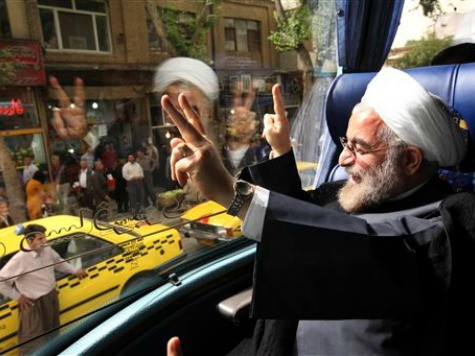(AP) By ALI AKBAR DAREINI – Iran’s president-elect called his win in national elections this month a vote for change and vowed Saturday to remain committed to his campaign promises of moderation and constructive interaction with the outside world.
Hasan Rouhani’s promises of outreach could lower the political temperature between Iran and the West and perhaps nudge the country’s ruling Islamic establishment toward a more flexible approach in its standoff over Tehran’s disputed nuclear program.
Rouhani has already promised greater openness on the nuclear issue while at the same time siding with the hard-liner establishment that refuses to halt uranium enrichment. He believes it’s possible to strike a deal that would allow the Islamic Republic to keep enriching uranium while assuring the West it will not produce a nuclear weapon.
The U.S. and its allies fear Iran may ultimately be able to develop nuclear arms. Tehran has denied the charges, saying its program is peaceful and aimed at generating electricity and producing radioisotopes to treat cancer patients.
The reformist-backed Rouhani won a landslide majority in June 14 presidential election, defeating his conservative and hardline rivals. He will succeed hardline outgoing President Mahmoud Ahmadinejad early August.
“People chose a new path … People said in this election: We want change,” Rouhani told a conference in Tehran Saturday. “The best language of the people is the ballot box. The people’s vote is very obvious. There is no ambiguity.”
Rouhani’s election has revived hopes for a mutually acceptable deal over Iran’s disputed nuclear program, as it was seen in part as a referendum on Iran’s nuclear diplomacy. The country’s top nuclear negotiator Saeed Jalili, a hard-liner who supported a policy of resistance, finished third in the vote, which was widely seen as rejection of his tough stance on the nuclear issue.
Rouhani said he will keep his promise of following a path of moderation in domestic and foreign policy.
“Moderation in foreign policy is neither surrender nor conflict, neither passivity nor confrontation. Moderation is effective and constructive interaction with the world,” he said.
The final word on all state matters, particularly on the nuclear issue, lies with Supreme Leader Ayatollah Ali Khamenei, but a strong president can influence decision-making.
Rouhani has vowed that he will seek to have the stinging economic sanctions against Iran lifted and work with international powers to settle the nuclear issue through active diplomacy and dialogue.
The president-elect also said that the ruling system needs to allow more freedom for Iran’s relatively young population.
“Happiness is people’s right,” he said. “I thank police for increasing the threshold of their tolerance.” He was referring to wild street celebrations after he was declared winner of the election.
Iran’s anti-vice police sporadically detain youths on vague charges of not observing Islamic codes. During Ahmadinejad’s presidency, many detainees claimed to be mistreated while in detention.
“We should talk to girls and boys in the same way we talk to our own children. People’s dignity must be preserved. Humiliating people is not acceptable but giving (polite) notice (of a morality offense) is fine,” Rouhani said.

COMMENTS
Please let us know if you're having issues with commenting.